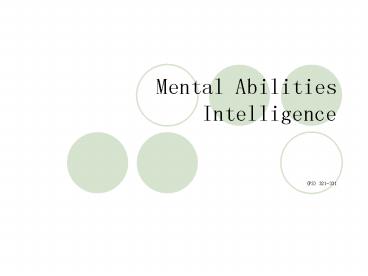Mental Abilities Intelligence - PowerPoint PPT Presentation
1 / 9
Title:
Mental Abilities Intelligence
Description:
Mental Abilities Intelligence (PS) 321-331 Psychometric approach It analyzes people s responses to questions and tasks in order to describe the structure of ... – PowerPoint PPT presentation
Number of Views:121
Avg rating:3.0/5.0
Title: Mental Abilities Intelligence
1
Mental AbilitiesIntelligence
- (PS) 321-331
2
1. Psychometric approach
2. Information processing approach
3. Triarchal approach
Intelligence
4. Multiple Intelligences approach
5. Ecological approach
3
Psychometric approach
- It analyzes peoples responses to questions and
tasks in order to describe the structure of
intelligence. - Spearman noted that scores on almost all tests
of mental abilities were positively correlated.
People who did well on one test also tended to do
well on all of the others. He concluded that
these correlations were created by general mental
ability, which he called g, for general
intelligence, and a group of special
intelligences, which he collectively referred to
as s. The s factors are the specific
information and skills needed for particular
tasks. The correlations that could not be by
either g or s were called group factors. - L.L.Thurstone he criticized Spearmans
mathematical methods. He analyzed the
correlations among IQ tests to identify the
underlying actors, or abilities, beaing measured
by those tests with a statistical technique
called factor analysis. He found seven relatively
independent primary mental abilities, which he
labeled as numerical ability, reasoning, verbal
fluency, spatial visualization, perceptual
ability, emory, and verbal comprehension. He
didnt deny that g exists, but he argued that
its not as important as primary mental abilities
in discribing a particular person. - Raymond B. Cattell he agreed with Spearman, but
suggested that there are two kinds of g, which
he labeled fluid and crystallized. - Fluid intelligence the basic power of reasoning
and problem solving. It allows us to think
critically about assertions and understand
relationships between concepts. - Crystallized intelligence it involves specific
knowledge gained as a result of applying fluid
intelligence.
4
- Who is right?
- Most psychologists today agree that there is a
positive - correlation between several tests of mental
ability, a - correlation that is due to a factor known as g.
The - brain probably does not contain some unified
thing - corresponding to what people call intelligence
g is - more likely a collection of subskills and mental
abilities, - many of which are needed to suceed on any test of
- intelligence.
5
Information-processing approach
- It analyzes the process of intelligent behavior,
not test answers and other products of
intelligence. This approach relates the basic
mental processes of perception, memory, and
thought to the concept of intelligence. - Earl Hunt suggested that intelligent behavior
depends on the amount of attention that we can
mobilize. He suggested that people with a greater
intellectual ability have more attentional
resources available. - Jensen Vernon thought that perhaps intelligent
people have faster brains than other people and
carry out mental processes more quickly. When a
task is complex, having a fast brain might
decrease the chance that information will
disappear from memory before it can be used. - Hans Eynseck proposed that intelligence can be
defined as the error-free transmission of
information through the brain.
6
Triarchal Theory
- According to Sternberg, a complete theory must
deal with three aspects of intelligence - Internal components (or processes)
- Performance components processes such as
perceiving stimuli, holding information in STM
and calculating sums and differences - Knowledge-acquisition components they involve
the selective application of the processes used
in gaining and storing new information - Metacomponents they control the performance and
knowledge-acquisition components they are
involved in organizing and setting up a problem. - Relation of the internal components it amounts
to the ability to profit from experience by
altering how the components are applied. - External effects adapting or shaping
environments. It means being intelligent in
areas that psychology doesnt examine in everyday
life.
7
Multiple Intelligences
- Howard Garnder supported the idea that cases of
remarkable ability in specific areas constitute
an evidence of the existence of multiple
intelligences. He looked not just at test scores
and information-processing experiments but also
at the ways in which children develop, at the
exceptional abilities of child prodigies and
remarkable adults, at biological research, and at
the values and traditions of various cultures. - According to Gardner, all people possess a
numberof intellectual potentials or
intelligences, each of which involves a set of
skills that allows them to solve problems.
Biology provides raw capacities to each of these
intelligences cultures provide symbolic systems
such as language to mobilize the raw capacities. - The specific intelligences that Gardner proposes
are - Linguistic
- Logical-mathematical
- Spatial
- Musical
- Body-kinesthethic
- Personal
- Intrapersonal
- Naturalist
- Existentialist
8
Ecological Approach
- The ecological approach to intelligence views
intelligence as mental activity that allows
people to select, shape, and adapt to those
aspects of the environment most relevant to their
lives. - The ecological approach suggests that
intelligence is not the same in all environments.
9
Mental abilities thinking
- Unusual mental abilities
- Giftedness
- Mental retardation
- Learning disabilities
Creativity































![READ⚡[PDF]✔ Mating Intelligence Unleashed: The Role of the Mind in Sex, Dating, and Love PowerPoint PPT Presentation](https://s3.amazonaws.com/images.powershow.com/10047344.th0.jpg?_=20240604103)